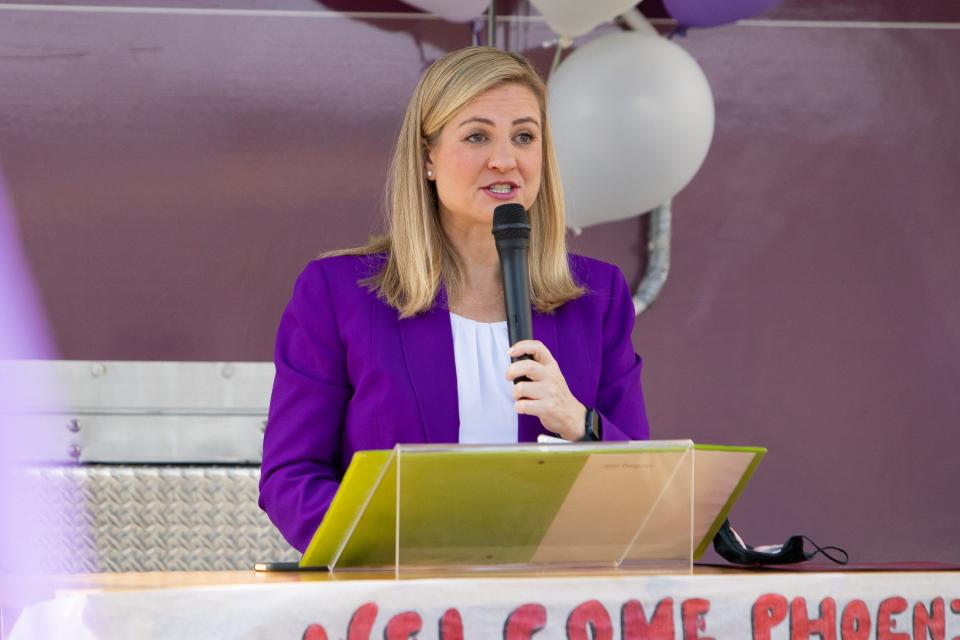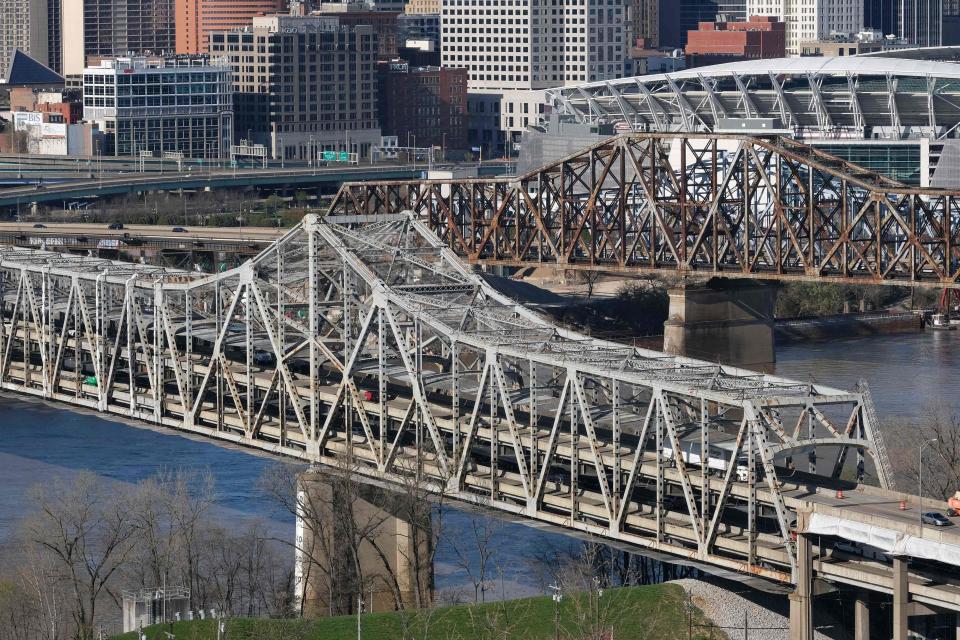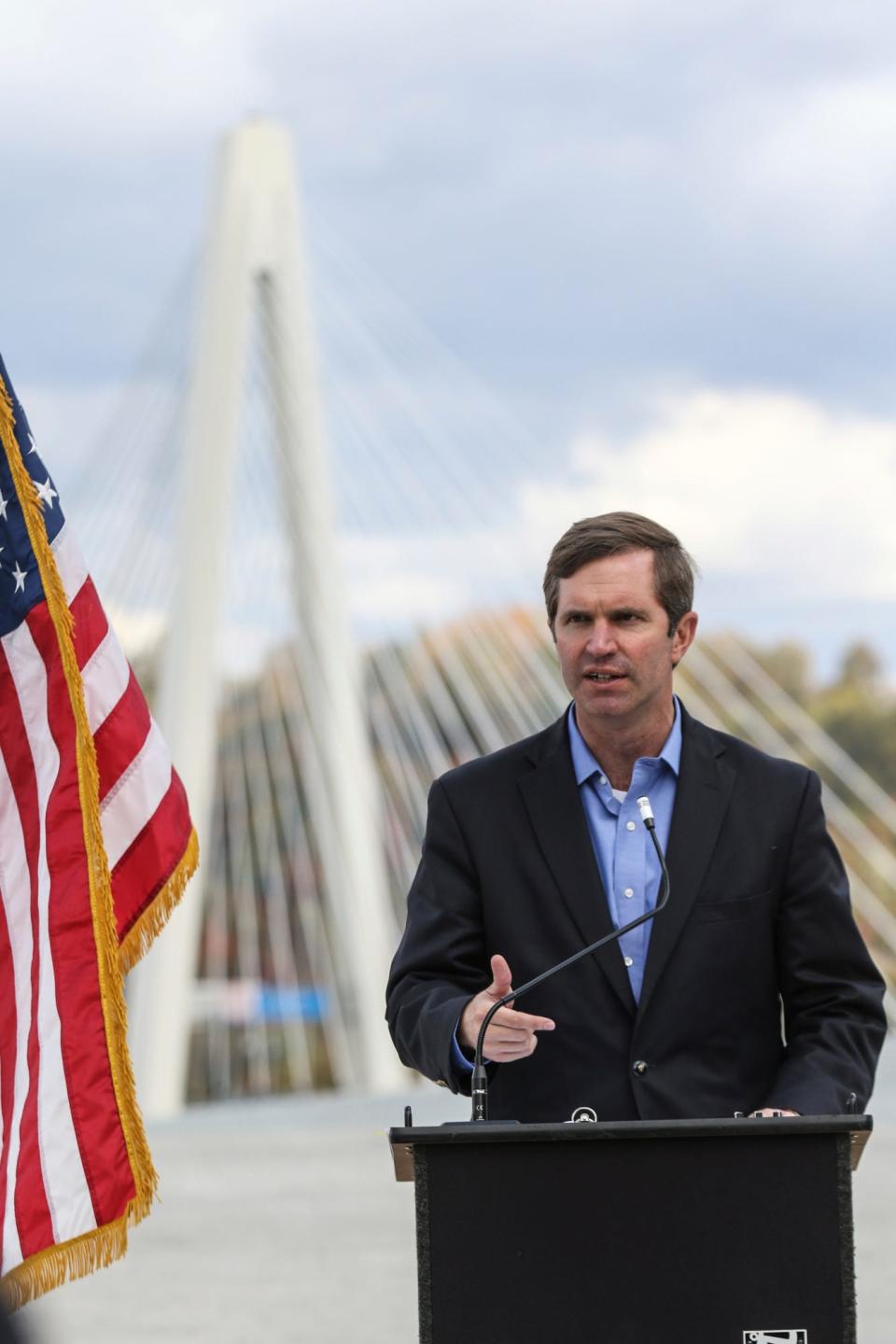A 'game-changer'? Mayors, governors ready to compete for $1 trillion in infrastructure funds
- Oops!Something went wrong.Please try again later.
The Port of Mobile in Mobile, Alabama, is about to get a lot busier.
Already one of the fastest-growing shipping ports in the nation, it will accommodate larger vessels after the U.S. Army Corps of Engineers in May kicked off a three-year, half-billion-dollar project to widen and deepen its channel.
The updates will mean more goods entering and leaving – and more pressure on the port's nearby railroads, highways, airport and inland waterways.
That's why Mobile Mayor Sandy Stimpson has his eye on President Joe Biden's $1.2 trillion infrastructure package, which Biden plans to sign into law Monday. Stimpson wants to secure money to address a severe bottleneck on Interstate 10 by finally building a new 8-mile bridge over the Mobile River delta, a potential $2 billion undertaking. He also wants money to continue the overhaul of the city's airport and build out warehouses and docks.
"We have a very compelling case to be made for some of these funds," Stimpson said, calling the possibility of the port expansion, a new bridge and the airport's transformation "three multigenerational game-changers" for the Gulf Coast. "It's just an amazing story of what could be."
Even before the bill becomes law, Stimpson and other mayors and governors across the country are dusting off grant proposals and assigning staff to prepare for a historic windfall of funding for infrastructure.
"I don't have a lot of concerns," said Stimpson, a Republican, who was among a contingent of local and state leaders who lobbied for infrastructure during a visit to the White House in July. "I just have a lot high hopes, let's say, that we can qualify for (funding)."
The bipartisan bill – which passed with support from most congressional Democrats, 13 House Republicans and 19 Republican senators – includes $110 billion for roads and bridges; $66 billion for Amtrak improvements and expansion; $65 billion for broadband internet expansion; $65 billion to rebuild the nation's electric grid; $55 billion to upgrade water systems, including replacing lead pipes; and billions for airports, sea ports, public transit and electric vehicle charging stations.
Yet even the largest road and bridge package since the Interstate Highway Act can spread only so far. The final price tag, which covers spending over eight years, is half the $2 trillion that Biden first proposed in April, and a significant portion of money will be delivered through competitive grants. That means states and cities, in some cases, will compete for the same pot of money.
"We are going to have to be all hands on deck to be ready," said Phoenix Mayor Kate Gallego, who has already started talks with vendors for certain projects.
'We're hoping to change some lives,' Phoenix mayor says
After securing his most significant legislative win as president, Biden now faces pressure to deliver to communities. The White House plans to appoint an "infrastructure coordinator" from outside the administration to oversee the bill's implementation.
Transportation Secretary Pete Buttigieg said the spending will mean expanding existing federal funding programs and launching others from scratch aimed at reconnecting neighborhoods, improving street safety and other new initiatives. Other funding streams are more formulaic. For example, all states will receive $100 million for broadband expansion, with additional spending determined by need.
"We've got to work very hard to make sure that we get it right," Buttigieg said. "That the criteria are transparent, that it is easy to understand how to apply – whether you are a big city with full-time staff here in Washington, D.C., or a small, rural community trying to navigate that federal process."

Gallego, a Democrat, wants money to expand Phoenix's tree canopy in low-income neighborhoods, improve traffic and pedestrian safety for walkers and cyclists, and build electric vehicle charging stations. There's particular intrigue for the latter, she said, given Phoenix's emergence as a hotbed for electric vehicle companies.
Above all, Gallego hopes the infrastructure dollars will translate into major transit expansion in Phoenix, singling out some of the city's Latino communities on the west side that lack access.
"We're hoping to change some lives with this investment," Gallego said. "Transportation is access to economic opportunity."
Arizona is in line to receive an estimated $884 million for public transit. Gallego wants to use Phoenix's share to lower emissions of the city's bus fleet, improve access for people with disabilities, and help cover costs to triple the length of Phoenix's light rail system, which runs 28 miles connecting Phoenix, Mesa and Tempe. She also hopes Phoenix can benefit from funding for Amtrak, a passenger rail service that does not serve Phoenix despite its growth into the fifth-largest U.S. city.
"When I talk to some of the neighboring big-city mayors, we dream of letting someone else do the driving as we travel between our communities, and I know that's true of so many of our residents," Gallego said, adding that Amtrak officials "seem very enthusiastic" about adding connectivity to Phoenix.
Help for public transit: The nation's ailing bus and rail systems have a D- rating. Can Biden's infrastructure plan fix them?

Perhaps no project better exemplifies the hopes locally for Biden's infrastructure package than the Brent Spence Bridge, which carries interstate traffic over the Ohio River, connecting Cincinnati and northern Kentucky.
The double-decker bridge, which opened in 1963, is notorious for congestion, having been declared functionally obsolete by the Federal Highway Administration in the 1990s because its narrow lanes carried more cars that it was designed for. More than 163,000 vehicles a day cross the bridge, which makes it one of the heaviest-traffic bridges in the nation.
Still, for decades, officials in Ohio and Kentucky have failed to advance plans to build a new bridge alongside the Brent Spence Bridge.
"We can get it done now," Biden said in an interview with Cincinnati's WKRC-TV last week, stressing the more than $10 billion Kentucky could receive for roads and bridges from the infrastructure package.
More: The project no one can get done: A new bridge between Cincinnati and Northern Kentucky

Kentucky Gov. Andy Beshear, a Democrat, told USA TODAY that if the federal government awards Kentucky a "reasonable amount of money" to match state funds for the estimated $2.5 billion project, then the new bridge can be built without any tolls to cover costs.
More: Does your state have the worst bridge in America? Joe Biden wants to know
Beshear said the bridge would be a "game-changer" for Kentucky, Ohio, economic development and companies as they transport goods.
"There have been four presidential administrations – at least – that have talked about getting this project done. Provided that we get a significant award from either that major projects bucket or another, we can get this thing done. It is thrilling. ... It is accomplishing what many thought was impossible."

White House tempers expectations on getting money out the door
Maryland Gov. Larry Hogan, a Republican who has pushed for greater federal infrastructure funding, joined Biden last week at the Port of Baltimore, where the president highlighted the infrastructure package. Maryland is in line for an estimated $6 billion for roads, bridges, ports and other infrastructure from the legislation.
"We see it as as force multiplier," Hogan said in an interview with USA TODAY, arguing it will complement state money Maryland has devoted to infrastructure during his tenure. "This is going to help us move to the next level on a number of other projects."
Hogan said the state "won't waste any time" to apply for the funding but won't make final decisions until federal guidance on timing and other details are available. Hogan has pumped money into port upgrades, highway improvements, airport expansion and the state's Purple Line, a light rail connection in Washington suburbs under construction. He said the money will allow the state to "move forward faster" on some projects and begin others that had gone unfunded.
"Every state, including ours, has things that we have not been able to do that we'll just have to take a look at now that we have an additional amount of money," Hogan said.

Chattanooga, Tennessee, Mayor Tim Kelly said his city has "no shortage of exciting projects," pointing to a "long-overdue" restoration of the Walnut Street Bridge, a pedestrian bridge that connects the city's downtown and north shore across the Tennessee River. In another part of town, he said, bridges that cross a railyard can't handle firetrucks, presenting "a looming safety crisis."
"They've got to be replaced, and we've been agonizing over how to do it, so this should help us move the needle," he said.
Kelly, an independent, also wants to tap $3.5 billion in infrastructure money available for home weatherization to boost a Tennessee Valley Authority program that helps low-income households become more energy-efficient. He said Chattanooga could also use money to expedite road projects, such as the extension of Central Avenue, and to carry out a 20-year plan to expand Chattanooga's airport.
"At his point, we're trying to identify the projects. And that's not very difficult because we know what they are," Kelly said.
Federal infrastructure projects are notorious for taking longer than expected, which presents another challenge for the Biden administration.
Commerce Secretary Gina Raimondo acknowledged it "will take us some number of months to start getting the money out the door." She said the administration wants to get projects underway "as fast possible but in a quality way." Speed will vary by project. She said offering subsidies for broadband in underserved areas, for example, will happen faster than laying fiber.
"I promise you this," Raimondo said. "A year from now, many, many people will be working in high-quality jobs because of this package, but I also promise you that the president wants to get it right."
More: Joe Biden wants to provide millions of Americans with high-speed internet. It won’t be easy.
Denver Mayor Michael Hancock, a Democrat first elected in 2011, said he hopes to secure infrastructure money for Denver International Airport's terminal expansion, bridge repairs and the extension of the city's bus rapid transit system to Colfax Avenue, known as the longest commercial corridor in America. It stretches more than 50 miles east through suburbs and town.
Hancock also wants Denver to help lead the way in the expansion of electric vehicle charging stations. He pointed to $1.1 billion in bonds for infrastructure that Denver voters passed over the past four years via referendum "all in preparation for this moment." It's money, he said, that can be used as matching funds.
"We have shovel-ready projects. We have money for matching," Hancock said. "And all we need now is to get the guidelines and the rules and regs out of the bed on how we will access these dollars."

Reach Joey Garrison on Twitter @joeygarrison.
This article originally appeared on USA TODAY: States, cities gear up for $1 trillion infrastructure windfall

